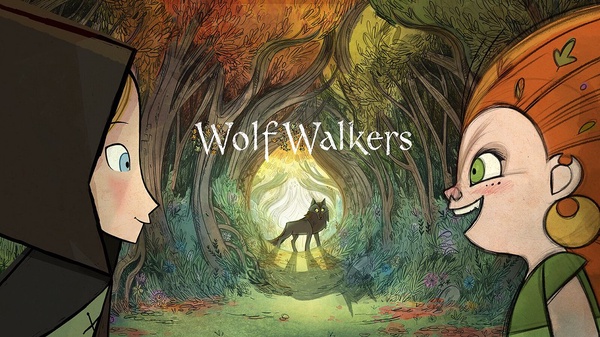
The Academy Awards are this Sunday, and the nominees for Best Picture will surely get a lot of attention in the coming days, and for good reason. But here’s a film you shouldn’t miss. Nominated in the category of “Animated Feature,” Wolfwalkers is directed by Tomm Moore and Ross Stewart and is part of an Irish trilogy based on Celtic folklore. The animation is beautiful and the storytelling is particularly compelling, for children and adults alike.
My friends on Facebook will know that I’ve struggled to find a suitable First Holy Communion gift for my eight year old daughter, and felt considerable disappointment in a religious bookstore last week when I was browsing the children’s book section which contained books in which children are taught a very hierarchical understanding of the church. For example, one book by Fr. Lovasik explains “Jesus tells me what God wants me to do through the Catholic Church.” Another described St. Maria Goretti, who was sexually assaulted and murdered, as an example of “obedience” and “purity.” It is hard to have such obvious reminders of the patriarchy of the Church. I’ve written elsewhere about how religious education materials can groom children for clerical sexual abuse because children are taught to “obey” the priest without question. Parents and teachers need better resources. Where can they go?
Wolfwalkers is a film that the family can watch and discuss together. It raises themes of family, friendship, nature, and responsibility. The film introduces the intersections of colonialism, patriarchy, and domination of the natural world in a way that is appropriate for younger audiences. The themes are complex and children can begin to recognize through the portrayal of the “Lord Protector” that so-called “religious” figures are not always “holy.” This is heavy stuff, but so important for parents to discuss with their children.
The central characters are Robyn and her father, who are English and part of the Lord Protector’s colonizing force in this 17th century Irish fort, and Mebh and her mother, who are wolfwalkers in the forest surrounding it. The Lord Protector uses power, threats, and theology to dominate.
Tomorrow I will show them I have tamed you, just as I have tamed this land. And they will have nothing to fear if they trust in the Lord’s will.
Lord Protector
Put manners on that girl or manners will be put on her.
Lord Protector
Robyn and Mebh face choices throughout, and have to discern the right course of action. The film is a beautiful portrait of discernment and personal growth. It invites us to think about what we fear and why, to ask questions, to treasure friendship, and to question authority figures who seem to act only in their own self-interest. I won’t say anything more because I don’t want to spoil the experience, but I highly recommend this film for families with children 7 and older, especially with young girls who need more opportunities to talk to their parents and siblings about girls’ decision-making and female role models. And if your kids are like mine, they will be singing Aurora’s Running with the Wolves afterwards.




Thank you for this review. Of all the Christian reviews on the first page of my Google searches, this was the only reasonable, balanced view.
I’m disheartened by the defensiveness I read from other Christian sources in reflection of the portrayal of Christianity in context of the treatment of non-Christians. So many claimed the movie was anti-Christian or dangerously oversimplifying the purity of the pagans. It’s unfortunate that the top searches produced these viewpoints that display hubris in the face of Christian wrongdoing instead of a willingness to look inward and confront a history of colonization that, if they were open to it, might surprise those who only thought colonization was brought to North American shores.
All that said, I wonder if you have a perspective on whether or not the Church is making progress on spreading humility in context of this history of injustices that has gone before. While Pope Francis has surely taken large, meaningful strides around the topic of the Church’s role in the Canadian residential schools and particularly with the repudiation of the Doctrine of Discovery, I feel somewhat hopeless that this awareness (dare I say wokeness) will filter down to the parish level.
Is there anything an individual can do to support this critical work?
Regards,
Marcus: free_scotland@hotmail.com